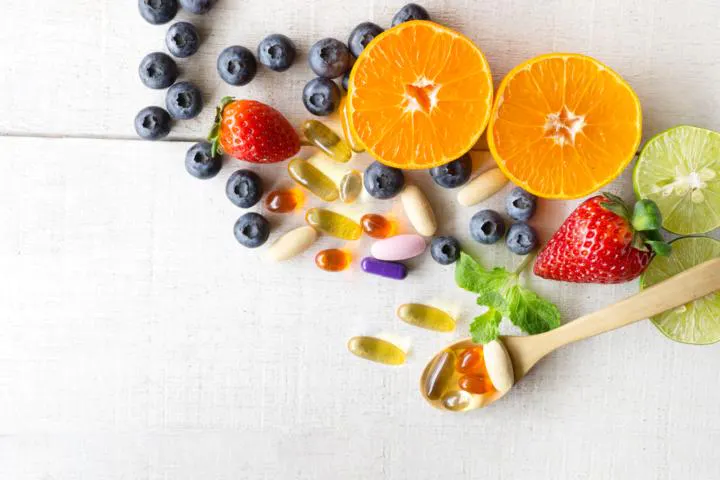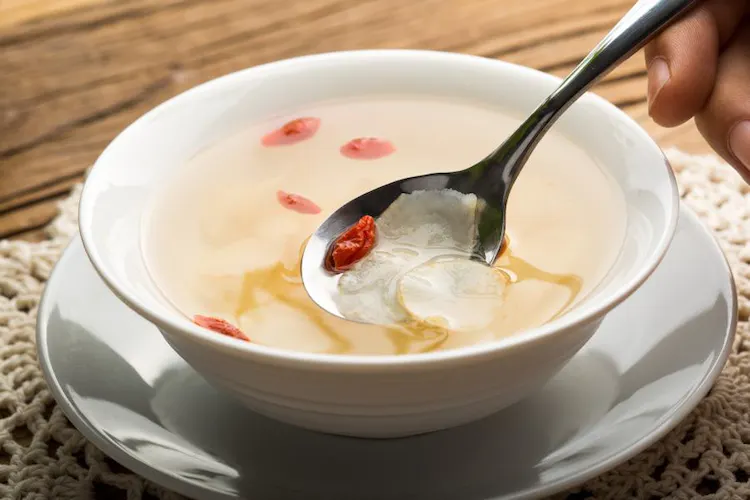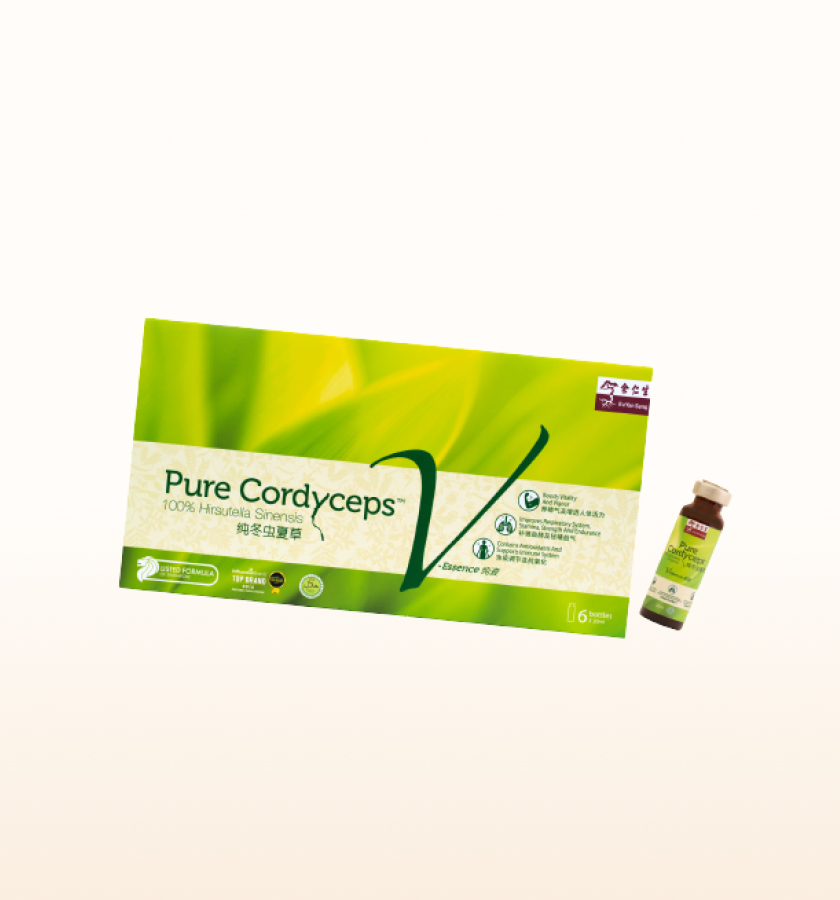Foods And Supplements
Got COVID? Try Immune-Boosting Foods And Supplements
Posted on 7 Nov 2022

If you want more beautiful skin or better digestive health, chances are you’re taking nutritional supplements to help achieve that. But did you know there are foods and supplements that work well together as an immune system booster? That’s never been more important than now — especially if you have or are recovering from COVID-19.
So what are the best foods and supplements to strengthen up your immune system? The answer: Those that provide your body with the building blocks to fight excess inflammation and restore your body on a cellular level.
In Traditional Chinese Medicine (TCM), good health is a balancing act between yin and yang elements, as well as a healthy flow of qi, or vital energy, throughout the body. Physician Zhang Ruifen from Eu Yan Sang clinic explains, “Herbs or remedies that aim to supplement the deficiencies in an individual’s body will help to build a stronger immune system.”
This article highlights some essential foods, plus supplements, vitamins, and minerals that are considered immune system boosters. You’ll also find out how TCM views the immune system and how TCM herbs can improve your immune response.
Foods To Boost Your Immune System
 Both fresh fruits and supplements contain the vitamins and nutrients necessary for a healthy immune system.
Both fresh fruits and supplements contain the vitamins and nutrients necessary for a healthy immune system. The primary way you should get the minerals and vitamins that boost your immune system is through your diet. In fact, the Dietary Guidelines for Americans say that healthy adults should get most of their nutrients through their diet. They recommend taking supplements if you have dietary deficiencies.
So, what should you eat to provide the most vitamins for your immune system? Fortunately, there are no complicated rules to learn. The best foods to strengthen the immune system are the same foods experts recommend for overall good health. That means whole foods like fresh fruits and vegetables, whole grains, and lean proteins. Here’s a list of foods to eat for a good immune system:
- Citrus fruits, including oranges and grapefruit
- Broccoli
- Garlic and ginger
- Spinach and other leafy greens
- Yogurt and other fermented foods, such as sauerkraut
- Tropical fruits, including papaya and kiwi
- Lean protein, such as chicken and fish
How To Take Supplements
Supplements are generally a safe way to get vitamins and minerals, as are most over-the-counter TCM herbs. But it is important to make sure you take TCM herbs two hours apart from other supplements. And if you have any underlying health issues, physician Zhang cautions that you should first consult a TCM physician for instructions on dosage and frequency. In addition, if you take any medications, always consult with your doctor before starting a new supplement to avoid any interactions.
Here are some of the most immune-boosting nutrients and herbs, and how you can get them through your diet and as supplements.
Vitamin C
Vitamin C bolsters your immune system’s ability to fight infection and helps your body absorb and store iron. It is also an antioxidant that helps protect you from free radicals, inflammatory molecules that can contribute to heart disease, cancer, and more.
Plus, without it, your body would be unable to form new tissues, like those found in your skin, blood vessels, and muscles.
Your body doesn’t make vitamin C. You can only get it from food or supplements. You can find it in citrus fruits and in leafy greens and berries, especially strawberries. Vitamin C supplements are widely available, but it’s possible to have too much of a good thing. Taking more than 2,000 mg of vitamin C a day can lead to adverse side effects.
Vitamin D
Vitamin D helps regulate the cells in your body that fight infection, especially respiratory tract infections, such as COVID-19. In addition, it helps your body retain calcium and phosphorous for bone health. Fish such as salmon, sardines, and tuna are the best sources of dietary vitamin D. And many foods, like milk, orange juice, and cereal, are fortified with vitamin D. But it is hard to ingest enough to maintain a healthy vitamin D blood level. Fortunately, your body makes vitamin D when your skin is exposed to sunlight.
Nonetheless, almost 42% of adults in the U.S. are deficient in vitamin D, so a supplement may be recommended if your levels are low. The recommended daily amount of vitamin D needed is 600 IU for people under 70 years old and 800 IU for people over 70 years.
Vitamin K
Studies have shown that vitamin K deficiencies contributed to poor outcomes for patients hospitalized because of COVID-19. In addition, vitamin K works in tandem with vitamin D to help keep your bones healthy. It’s also essential for blood clotting.
There are two types of vitamin K: K1 and K2. Your body produces vitamin K, but you can also get it from the food you eat. Vitamin K1 is mainly present in green leafy vegetables and fruits. In the absence of bacteria, vitamin K1 can convert into vitamin K2 MK-4 isoform in mammalian cells. Vitamin K2 can be found in fermented foods like sauerkraut and miso, meat, and cheese.
Vitamin K deficiency is very rare. Most people in the U.S. get enough vitamin K from the foods they eat. Also, bacteria in the colon make some vitamin K that the body can absorb. However, certain groups of people may have trouble getting enough vitamin K:
- Newborns who don’t receive an injection of vitamin K at birth.
- People with conditions (such as cystic fibrosis, celiac disease, ulcerative colitis, and short bowel syndrome) that decrease the amount of vitamin K their body absorbs.
- People who have had bariatric (weight loss) surgery.
When needed, a supplement can help you get enough vitamin K. Look for one that contains types of K2, MK-4, and MK-7. The National Institutes of Health recommends:
- Adult men 19 years and older:- 120 mcg daily
- Adult women 19 years and older:-90 mcg daily
- Pregnant or breastfeeding teens:- 75 mcg daily
- Pregnant or breastfeeding women:- 90 mcg daily
Zinc
Zinc is a very important nutrient for a healthy immune system. It helps with wound healing and increases the production of white blood cells and T cells that fight infection. It also helps the body make proteins and DNA, the genetic material in all cells.
During pregnancy, infancy, and childhood, the body needs zinc to grow and develop properly. Moreover, zinc is essential for your senses of taste and smell.
Zinc supplements are available in many forms, such as lozenges, capsules, and tablets. Taking zinc as a nasal spray is not recommended since it can lead to loss of smell. For women, the maximum recommended dose of zinc is 8 mg; for men, it is 11 mg.
American Ginseng
 You can consume American ginseng by cooking it as a herbal soup. Delicious and energizing!
You can consume American ginseng by cooking it as a herbal soup. Delicious and energizing! Ginseng is a potent root that has numerous health benefits, including boosting the performance of cells that fight infections.
Physician Zhang says, “Herbs such as American Ginseng are generally mild and can tonify both qi and yin in a body, and are popularly used as immune system boosters. For better results, patients should consult a TCM physician to properly understand their body constitution, so as to know what remedies, diet, and lifestyle habits are best for them to strengthen their immune system.”
Cordyceps
Cordyceps is a type of fungus that grows on insects. Despite its unappetizing origins, cordyceps is the powerhouse of an herbal remedy. Studies have shown that cordyceps is a potent immune system booster as it can help the body fight inflammation and boost the body’s ability to fight new diseases. It can also help ease sore muscles, manage diabetes, and maintain youthfulness.
Cordyceps supplement is available in different formulations, such as essence, soup, powder, capsule, or tablet. You can also make cordyceps into tea. Follow all dosing instructions carefully. A good rule of thumb is to ingest no more than 3-6 grams per day. You may also wish to consider taking a Lingzhi Sporophore supplement to boost immunity, which contains the entire Lingzhi plant, including the mushroom cap and stalk.
Astragalus
The root of the astragalus plant offers benefits as an immune system booster. It contains compounds that increase your production of white blood cells, which help fend off invaders, such as viruses and bacteria. It is also used to treat conditions like anemia, seasonal allergies, and fatigue.
Astragalus is available as capsules, liquid extracts, and as a powder. However, when consumed without proper instructions, astragalus can cause side effects such as nausea and diarrhea. For that reason, take no more than 9 to 30 grams per day.
Your Eating Habit And Immune System Booster
 Always remember to eat well. That way, you can ensure your body has a good immune response.
Always remember to eat well. That way, you can ensure your body has a good immune response.
Supplements alone won’t give you good health. What you eat is your first line of defense against diseases. Physician Zhang reminds us that “your diet affects your body’s ability to absorb supplements, vitamins, and nutrients.” To live a healthy life, it’s important for all the systems of your body to work in harmony. And when all the systems of your body are in harmony, your body is better able to absorb nutrients.
If you do choose to use TCM supplements, physician Zhang explains that the treatments are based on an individual’s unique symptoms and health needs, so there is no one size fits all solution. Consult with a TCM physician to determine what will be of most benefit to you.
There is no magic ingredient for an immune system booster. But, a good diet can help strengthen your immune system. For that little extra protection, you can add supplements to your diet as recommended by a professional and needed.
.png)

